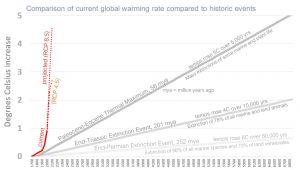Sixth Mass Extinction: Difference between revisions
m (→Phyla) |
mNo edit summary |
||
| Line 3: | Line 3: | ||
Carbon dioxide emissions are currently being emitted 10-100x faster than during any of the 4/5 previous mass extinctions triggered by runaway global heating.<ref>https://thecottonwoodpost.net/2019/12/10/modern-climate-change-is-10x-faster-than-historic-global-warming-mass-extinction-events/</ref> | Carbon dioxide emissions are currently being emitted 10-100x faster than during any of the 4/5 previous mass extinctions triggered by runaway global heating.<ref>https://thecottonwoodpost.net/2019/12/10/modern-climate-change-is-10x-faster-than-historic-global-warming-mass-extinction-events/</ref> | ||
Since 1970, 60% of | Since 1970, 60% of mammal, bird, fish and reptile populations have been killed by human beings.<ref>https://www.theguardian.com/commentisfree/2019/feb/12/politicians-killing-insects-ecosystems</ref> | ||
Freshwater habitats have been the worst hit, with populations collapsed by 83%. South and central America is the worst affected region globally, experiencing an 89% population collapse primarily due to deforestation. <ref>https://www.theguardian.com/environment/2018/oct/30/humanity-wiped-out-animals-since-1970-major-report-finds</ref> | Freshwater habitats have been the worst hit, with populations collapsed by 83%. South and central America is the worst affected region globally, experiencing an 89% population collapse primarily due to deforestation. <ref>https://www.theguardian.com/environment/2018/oct/30/humanity-wiped-out-animals-since-1970-major-report-finds</ref> | ||
Revision as of 15:53, 13 September 2022
Carbon dioxide emissions are currently being emitted 10-100x faster than during any of the 4/5 previous mass extinctions triggered by runaway global heating.[1]
Since 1970, 60% of mammal, bird, fish and reptile populations have been killed by human beings.[2]
Freshwater habitats have been the worst hit, with populations collapsed by 83%. South and central America is the worst affected region globally, experiencing an 89% population collapse primarily due to deforestation. [3]
In 2020, scientists estimated that "the critical window for preventing mass losses will close much sooner than formerly assumed — in 10 to 15 years." Due to non-linear dynamics, the loss of some species "will likely trigger a domino effect that sends others into a downward spiral, ultimately threatening entire ecosystems."[4]
History
Previous Extinctions
Four out of five of Earth's previous mass extinctions were caused by runaway global warming, including the most devastating - the Permian mass extinction 250 million years ago in which an estimated 90% of Earth's species perished. [5] Large emissions of carbon dioxide warmed global temperatures to the point that methane feedback loops were triggered, releasing vast amounts of the gas trapped in permafrost and the ocean seafloor. While the release of carbon dioxide was 'catastrophic,' the release of methane this triggered was 'apocalyptic' and was the 'ultimate source and cause' of the mass extinction. [6]
The mass extinction event which occurred during the early Jurassic period was also a consequence of rising CO2 levels, which deoxygenated the Ocean (as is currently happening today) leading to mass die-offs of marine life. [7]
CO2 input and environmental changes are currently occurring 12–16× faster than the Cretaceous mass extinction 65 million years ago. [8]
Current Causes
Phyla
Mammals
83% of Earth's population of Mammals have been wiped out, with livestock and human beings dominating the remaining population (by biomass) at 60% and 36%, respectively. [9]
Birds
A 2018 global study found that one in eight of known bird species are threatened with extinction, as the "situation is deteriorating and the trends are intensifying.” [10] The study identified agricultural expansion and logging as the two greatest threats to bird species currently, with climate collapse playing a role in nearly a third of imminent extinctions.
Insects
In 2019, the first global study of insect populations found that 40% of insect species are threatened with extinction, while the mass of insects has been declining by 2.5% a year for the last three decades.[11][12]
With 80% of insects already annihilated during this time, scientists warn that the ongoing loss of insects threatens the "catastrophic collapse of nature's ecosystem" and confirms that "the sixth major extinction event is profoundly impacting life forms on our planet."
The study found that the major causes of this collapse are habitat loss via conversion to intensive agriculture, agrichemical pesticides, and climate change.[13] Compliant politicians and policymakers who have fallen prey to lobbying pressure from culpable industries have played a significant role in enabling this catastrophic decline.[14]
Implications
1. General Biodiversity:
Insects are the most diverse group of animals on the planet, include more than a million described species, and represent more than half of all known living organisms. The number of extant species is estimated at between six and ten million, and potentially represent over 90% of the animal life forms on Earth. [15]
2. Ecosystem Support
3. Food Pollination
- ↑ https://thecottonwoodpost.net/2019/12/10/modern-climate-change-is-10x-faster-than-historic-global-warming-mass-extinction-events/
- ↑ https://www.theguardian.com/commentisfree/2019/feb/12/politicians-killing-insects-ecosystems
- ↑ https://www.theguardian.com/environment/2018/oct/30/humanity-wiped-out-animals-since-1970-major-report-finds
- ↑ https://www.nytimes.com/2020/06/01/science/mass-extinctions-are-accelerating-scientists-report.html
- ↑ https://www.independent.co.uk/climate-change/news/earth-permian-mass-extinction-apocalypse-warning-climate-change-frozen-methane-a7648006.html
- ↑ https://www.sciencedirect.com/science/article/abs/pii/S1871174X16300488
- ↑ https://news.fsu.edu/news/science-technology/2018/06/11/volcanic-activity-declining-ocean-oxygen-triggered-mass-extinction-of-ancient-marine-organisms/
- ↑ https://www.sciencedirect.com/science/article/abs/pii/S1342937X17303702
- ↑ https://www.theguardian.com/environment/2018/may/21/human-race-just-001-of-all-life-but-has-destroyed-over-80-of-wild-mammals-study
- ↑ https://www.theguardian.com/environment/2018/apr/23/one-in-eight-birds-is-threatened-with-extinction-global-study-finds
- ↑ https://www.theguardian.com/commentisfree/2019/feb/12/politicians-killing-insects-ecosystems?fbclid=IwAR0vz6jQx3dAe7ApRGv9DTKo7NLSrIH6s1k_DjokvSmW_kVxPslq7mWtDok
- ↑ https://www.theguardian.com/environment/2019/feb/10/plummeting-insect-numbers-threaten-collapse-of-nature
- ↑ https://www.sciencedirect.com/science/article/abs/pii/S0006320718313636
- ↑ https://www.theguardian.com/commentisfree/2019/feb/12/politicians-killing-insects-ecosystems
- ↑ https://untamedscience.com/class/insecta/
